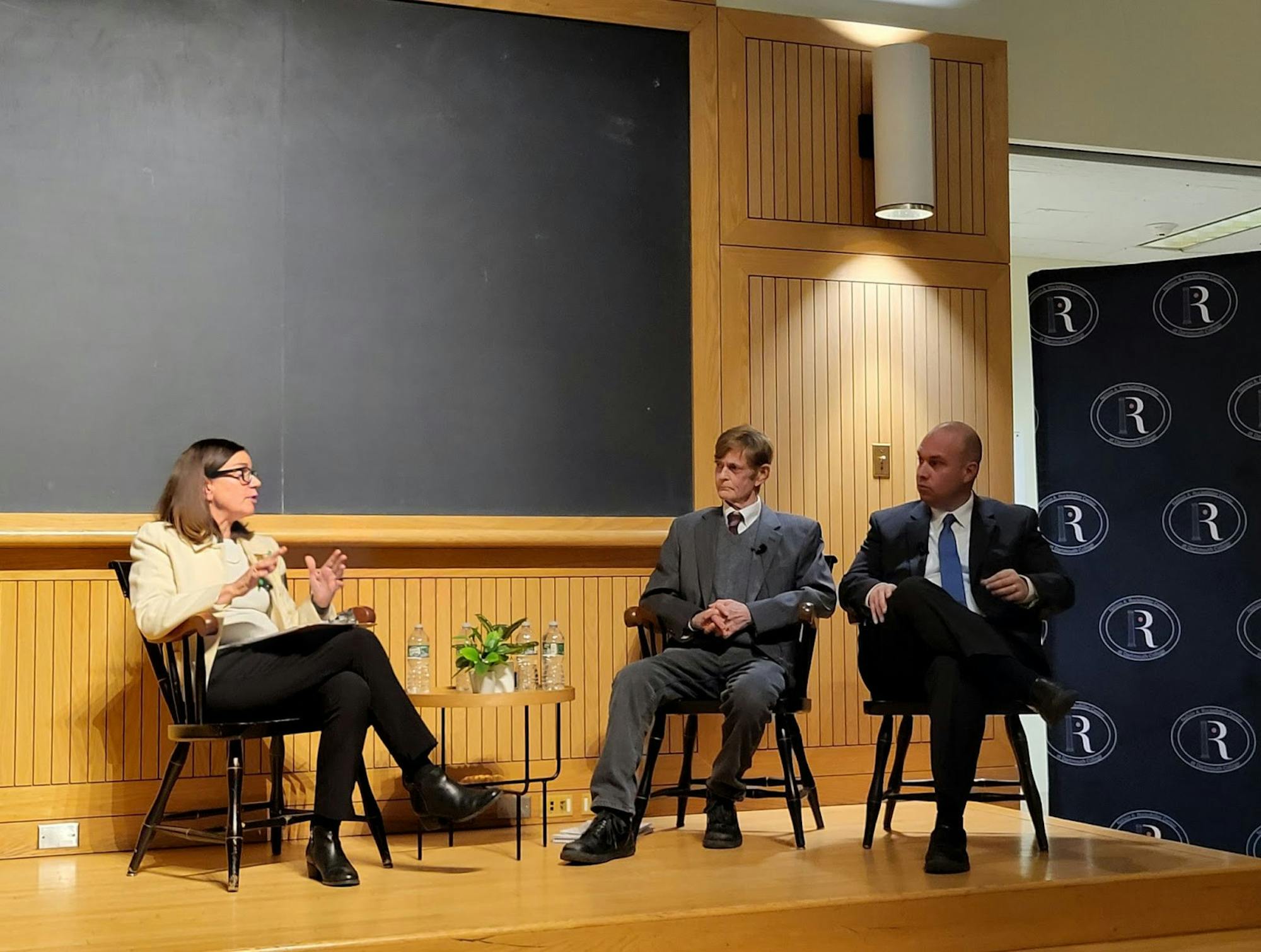On Jan. 10, the Rockefeller Center hosted The Concord Coalition Executive Director Robert Bixby and Committee for a Responsible Federal Budget Senior Vice President and Chief of Staff Mike Murphy for an event titled, “Debt and Deficits: Fiscal Challenges Facing the Next Administration.” According to its website, The Concord Coalition is a bipartisan group advocating for generational fiscal responsibility.
According to Rockefeller Center program officer Joanne Blais, 60 people attended the event in Hinman Forum, and an additional 50 people watched the livestream. Rockefeller Center assistant director Robert Coates said that the Committee for a Responsible Federal Budget initially reached out to the Rockefeller Center about organizing the event.
“They were interested in trying to get a profile for the debt deficit … with the backdrop of the attention from the first-in-the-nation presidential primary,” Coates said.
Coates said that the Rockefeller Center worked with Bixby and Murphy to create an interactive environment during the event. According to Coates, the speakers used a “conversational style format” that allowed Bixby and Murphy to present the content they thought was important while also opening the conversation up for students to ask questions directly to the panelists. Bixby and Murphy each spoke for about 10 minutes before transitioning to a Q&A moderated by economics professor Marjorie Rose.
Bixby started the event with an overview of the fiscal challenges facing the next presidential administration. In addition to the current budget deficit, Bixby highlighted the importance and urgency of understanding the “built-in trends” of the budget.
“If you’re thinking about public policy in any sense, no matter what field of interest you have, it eventually is going to have to run through the budget,” Bixby said. “So it’s important now, as public policy students, to get some sense of what you’re up against when it comes to federal funding and federal taxes.”
Referencing a chart of the federal budget, Bixby said that the deficit doubled last year from one trillion dollars to two trillion dollars, which he partly attributed to the COVID-19 pandemic. However, Bixby warned that the deficit will not return to pre-pandemic levels.
“The trajectory for the next president, for all of us, is that … we’re going to have trillion dollar deficits for as far as the eye can see,” Bixby said. “Even just going out 10 years, you’ve got budget deficits at astronomical levels.”
Bixby attributed the growing budget deficit to the faster rate of growth of expenses than growth of revenues. The biggest drivers of government spending are Social Security, Medicare and other healthcare programs, according to Bixby.
“This has nothing to do with being bad programs or Congress going on a spending spree,” Bixby said. “This is an underlying problem that’s tied to the aging of the population, which we can’t really do anything about.”
Bixby ended his presentation with a call to young voters to recognize the issue of the growing budget deficit and hold presidential candidates accountable for creating solutions.
“When you assess what you want to do [professionally], and what you want to ask future presidential candidates, [the deficit] has got to be one of the issues that you’re talking about,” Bixby said. “Let people know, ‘I’m 20 … and I want to know what our country is going to look like when I’m 40 or 50, when things are projected to be on an unsustainable track.’”
Murphy’s presentation proposed certain principles that voters should look for in a fiscally responsible campaign. These principles include candidates that are honest about the “true scope and the nature” of the budget deficit and prioritize planning to reduce it.
However, Murphy stressed that “unrealistic solutions” include plans that raise taxes or delay making cuts to government spending now because they will result in larger cuts in the long run. Instead, Murphy urged candidates to put all spending and revenue options “on the table” to deal with the deficit.
“[Bixby] talked about his questions for candidates about Social Security and Medicare,” Murphy said. “The only thing you want to be looking out for is … candidates putting forward actual ideas to address the solvency of Medicare and Social Security.”
Murphy also said that the next administration will have to face several deadlines coming up in 2025, including the deadline to re-raise the debt limit.
During the Q&A, former senator Rob Portman, R-Ohio, asked Bixby and Murphy to comment on current presidential candidates and their proposed policies to deal with the budget deficit. Bixby answered that the “issue is going to require presidential leadership.”
Joaquin Deprez ’26 said that he attended the event because he was interested in the domestic economy as a government major.
“Some of the numbers were staggering, especially the interest,” Deprez said. “We’re going to be paying more in interest than in defense.”
Coates said that he hoped attendees walked away with more awareness about the debt deficit going into the New Hampshire primary season.
“The debt deficit is not the sexiest topic in public policy,” Coates said. “I think giving [Bixby and Murphy] an opportunity to present this information definitely gets a little bit of the word out there that we’re spending lots of money, but we’ve got these pending, somewhat scary fiscal deadlines coming.”
Kelsey Wang is a reporter and editor for The Dartmouth from the greater Seattle area, majoring in history and government. Outside of The D, she likes to crochet, do jigsaw puzzles and paint.




